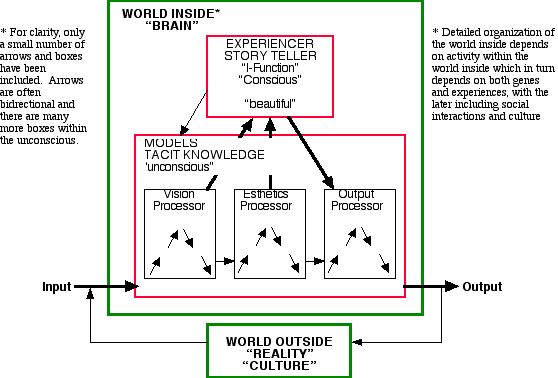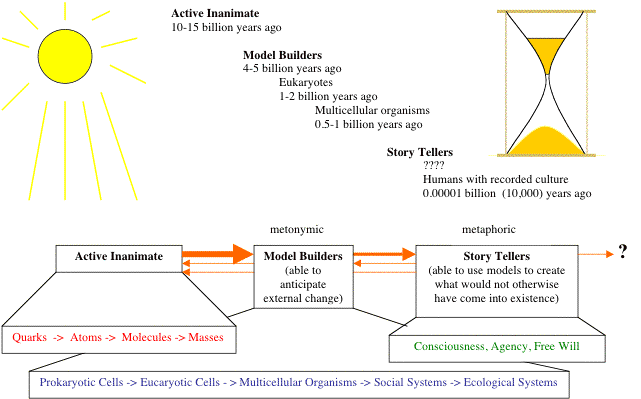"A foolish consistency is the hobgoblin ..."
(Ralph Waldo Emerson, Self-Reliance, 1841)
Could one relax the demand for consistency? Is it useful? Would it yield greater completeness?
"To be, or not to be: that is the question"
Shakespeare, Hamlet
 Another Trick: Take a fresh look at what evolution has created as an effective inquirer into/explorer of "reality" ....
Another Trick: Take a fresh look at what evolution has created as an effective inquirer into/explorer of "reality" ....
- Irreversibility already established (eg lateral inhibition network) (reservation: local vs global irreversibility)
- Inconsistency already established, is in fact a "neural uncertainty principle", comparable to the uncertainty inherent in quantum mechanics? and with same implications re reversibility? advantages re "computing"?
- Indeterminacy .... likely (VERY likely)
- Improved "completeness"?
- Roger Penrose, The Emperor's New Mind, 1990
- Four color problem
- "provable"? no ... "likely"? yep (product of Chaitin's "experimental math")
"To be, or not to be: that is the question"
Shakespeare, Hamlet
- Roger Penrose, The Emperor's New Mind, 1990
- Four color problem
- "provable"? no ... "likely"? yep (product of Chaitin's "experimental math")
Self-referentiality, recursion (more on the brain trick)

- Human brain is both iterative and recursive/self-referential (others?)
- Iteration (Wolfram) - deterministic but not compressible (Chaitin)
- Iteration plus - indeterminate and not compressible
- Iteration plus model model-building
- Iteration plus etc. and recursion/self-referentiality?
- Has both multiple "model building" and compressive/self-reflective ("story telling") capabilities
- Has distinctive "agency" capabilites vis a vis outside world: to conceive/bring into existence what would not result from "model building" (iterative change) - "free will"
- Has distinctive "agency" capabilities vis a vis itself: to conceive/bring into existence what would not result from "model building"
"I am, and I can think, therefore I can change who I am"
Click to go back to beginning on 15 July
How to proceed in face of "profound skepticism"?, ie with no fixed starting point that one can treat as unquestionable ...

- The universe happily iterated/evolved without formal axiomatic systems (recursion/self-referentiality?) for billions of years
- Humans have the capability to do so without formal axiomatic systems ("treeness")
- Humans also have the capacity to conceive/make use of AND modify formal axiomatic systems
- The combination gives us unusual capabilities IF we make use of both
- Whether "reality" a formal axiomatic system or not, create/use/modify formal axiomatic systems, but don't "believe" in them.
- Three Doors Problem can be addressed using several different "logics" (unexamined starting presumptions used to derive answers)
- "Logics" used can be different in different parts of brain
- Which logic to use is an experimental question (which "works"?); there is no absolute or foundational logic to appeal to
- Noticing conflicts essential (Three Doors a way to notice one), may yield new candidate "logics", new "understanding", ie a "logic" that connects things previously treated as separate (not "description" or just "compression" in local realm but greater connectedness)
- Introduction to ....
BAYESIAN INFERENCE:
WORKING WITHOUT A FOUNDATION?
- Interpret probabilities not as frequencies/distributions but as "degree of uncertainty", may/may not be based on prior observations (can be "subjective" to varying degrees)
- No true (1.0) nor false (0.0) but only numbers (continuously(?) varying) in between
- Bayes theorem for altering degree of uncertainty based on new observations

The new degree of uncertainty about an hypothesis when a new observation has been made ("posterior probability") is the old degree of uncertainty ("prior probability") multiplied by a "likelihood factor". The "likelihood factor" is the degree of uncertainty of the observation given the hypothesis divided by the degree of uncertainty of the observation by itself. - A simple case:
hypothesis = the sun comes up every day
prior probability high (uncertainty low)
new observation = the sun came up today
likelihood factor marginally greater than 1
posterior probability slightly increased (uncertainty margically reduced)hypothesis = the sun comes up every day
prior probability high (uncertainty low)
new observation = the sun didn't come up today
likelihood factor less than 1
posterior probability decreased (uncertainty increased) - Application to Three Doors
- actually MATTERS ( in practical, real life terms)
- is "surprising" to "story teller"/consciousness, not? to unconscious/"treeness" (see Piatelli-Palmarini, Inevitable Illusions, 1994)
- can become a part of "story telling"
- Other examples; problems of false positives and the like
- Point is not whether Bayes' Theorem is "true", point is it works in these situations and others, is a new "logic"/understanding, useful for "singular" cases. Furthermore, it provides a basis for inquiry which relies solely on present hypotheses and degrees of uncertainty about them. There need in principle be no other foundation, no presumption that there is a "reality" much less that it is one which itself derives from a small number of fixed principles
The Monty Hall Problem - Bayesian calculation
Monty Hall Solution - a variety of them
Cause, Chance and Bayesian Statistics
Bayesian Inference for the Physical Sciences
Introduction to Bayesian Statistics
AN UPDATED THEORY OF INFORMATION ?
(From the top down, hoping to meet from the bottom up in the middle)
What IS "information"?
"I have two children. one of whom is a girl. What sex is my other child?"
"I have two children, one of whom is a girl. She is the taller of the two. What sex is my other child?"
von Bayer, Information, Chapter 9
Information, to a human story-teller, is something that changes in a story the degree of uncertainty about something (alters Batesian "probability", critically dependent on ability to appreciate counter-factuals). There is no "information" unless there is such a change (information is not an intrinsic property of anything; it is fundamentally relational)
At the bottom level
"Information" can exist without humans, without counter-factuals. It is any organization of matter/energy that affects, in an at least somewhat non-random way, the organization of other organized matter/energy.
Between the "active inanimate" and "story tellers"
model makers =? as above except with added capability to become further modified by their own activity as decoders
humans (other model makers?) =? as above except with added capability to represent/use counterfactuals (Batesian inference can exist in model makers but doesn't there represent to the entity "uncertainty"). Implies (working from bottom up) that "information" is something that "fits", hence that in human thought there is something analogous to "shape", something that defines "spaces". Can be origin of "exploration"?
- Where/how does "indeterminacy" play into this series of related stories?
- Is "information" usefully quantifiable in this series of related stories?
- Are there, in this series of related stories, about whether and how information is created/destroyed?
- Can the series of related stories be further "squeezed" to yield useful "laws of information"?
Home
| Calendar | About
| Getting Involved
| Groups | Initiatives | Bryn Mawr Home | Serendip Home
Director: Liz McCormack -
emccorma@brynmawr.edu
| Faculty Steering Committee
| Secretary: Lisa Kolonay
© 1994-
, by Center for Science in Society, Bryn Mawr College and Serendip
Last Modified:
Wednesday, 02-May-2018 10:51:19 CDT